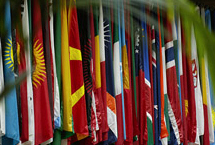
Typical street scene in Santa Ana, El Salvador. (Photo: iStock)
IMF Survey: IMF Asked to Aid G-8 With Exit Strategies For Crisis Policies
June 13, 2009
- G-8 sees signs of economic stabilization amid continued crisis
- Strauss-Kahn says essential to keep focus on emerging from crisis
- G-8 exploring ways to boost IMF lending to poor countries
Amid signs that the global economic crisis is stabilizing, the Group of Eight (G-8) advanced economies has asked the International Monetary Fund (IMF) to do the necessary analytical work to help governments prepare “exit strategies” to unwind the huge stimulus packages that have been deployed to combat the crisis.

Countries should keep focus on getting out of the current crisis before changing policies, IMF chief Strauss-Kahn emphasizes (photo: IMF)
Global Crisis
G-8 finance ministers and central bank governors, meeting June 12-13 in the southern Italian town of Lecce, warned, however, that despite improved business and consumer confidence in the advanced economies, “the situation remains uncertain and significant risks remain to economic and financial stability.”
They also noted that unemployment may continue to rise even after production picks up.
IMF Managing Director Dominique Strauss-Kahn said it was a credit to governments around the world that their policy actions were starting to have effect, but the recovery was weak and a lot remained to be done, particularly in the financial sector. He told reporters that the situation in some emerging market countries was still worrying.
While it was important to begin thinking about exit strategies for the postcrisis period, such as cutting back budget deficits, “it is even more important to first exit from the crisis.” So it was essential to continue work to provide stimulus to the global economy and to clean up bank balance sheets.
Promoting sustainable recovery
In a communiqué issued at the end of the talks, ministers said they had discussed the need to prepare appropriate strategies for unwinding the extraordinary policy measures taken to respond to the crisis once the recovery is assured. “These “exit strategies”, which may vary from country to country, are essential to promote a sustainable recovery over the long term,” the statement said. “We asked the IMF to undertake the necessary analytical work to assist us with this process.”
The ministers from the United States, Japan, Germany, France, Britain, Italy, Canada, Russia, plus the European Union were meeting ahead of a summit of G-8 national leaders in July in earthquake-stricken L'Aquila in central Italy.
In addition, the communiqué referred to the IMF’s role in providing rapid resources to counter the crisis, step up help to low-income countries, and reform the governance structure of the multilateral institution:
• Boosting IMF resources. “We have led efforts to provide the IMF with the necessary resources to expand its lending capacity and are fully committed to swiftly implement the London Summit commitment, and urge other countries to participate.”
• Strengthening concessional lending. “We are also exploring ways to substantially increase the IMF capacity for concessional lending through the sale of gold or other means, consistent with the new income model, and we encourage the Fund to explore the scope for increased concessionality to low-income countries.”
• Reforming the IMF. “We remain committed to reforming the IMF to enable it to carry out its critical role in the modern global economy.”
Bolstering IMF’s warchest
The Group of Twenty (G-20) industrial and emerging market countries had proposed at a summit in London in April a tripling of IMF lendable resources to $750 billion to help combat the crisis. Strauss-Kahn said commitments from the IMF’s 185 member countries were getting closer to the $750 billion figure and he expected to be able to finalize the resource arrangements by the end of 2009.
In addition, several other issues agreed at the G-20 summit were on the way to being completed, including:
• Help for low-income countries. While the G-20 had suggested a doubling of concessional lending to around $6 billion over 2-3 years, in fact it could reach some $8 billion, he said. Strauss-Kahn backed suggestions to make loans to low-income countries on an even more concessional basis.
• SDR allocation. The G-20 also mandated the IMF to make a new general allocation of the Fund’s quasi-currency of Special Drawing Rights (SDRs) to inject $250 billion into the world economy and increase global liquidity. Strauss-Kahn said proposals to proceed with this would be discussed by the IMF’s Executive Board on July 13.
Comments on this article should be sent to imfsurvey@imf.org


